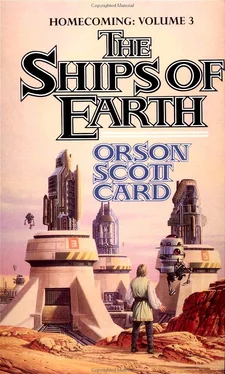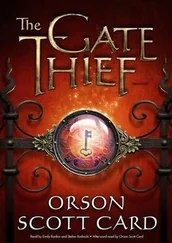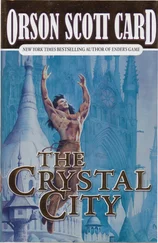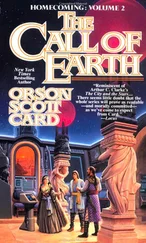Orson Card - THE SHIPS OF EARTH
Здесь есть возможность читать онлайн «Orson Card - THE SHIPS OF EARTH» весь текст электронной книги совершенно бесплатно (целиком полную версию без сокращений). В некоторых случаях можно слушать аудио, скачать через торрент в формате fb2 и присутствует краткое содержание. Жанр: Фантастика и фэнтези, на английском языке. Описание произведения, (предисловие) а так же отзывы посетителей доступны на портале библиотеки ЛибКат.
- Название:THE SHIPS OF EARTH
- Автор:
- Жанр:
- Год:неизвестен
- ISBN:нет данных
- Рейтинг книги:4 / 5. Голосов: 1
-
Избранное:Добавить в избранное
- Отзывы:
-
Ваша оценка:
- 80
- 1
- 2
- 3
- 4
- 5
THE SHIPS OF EARTH: краткое содержание, описание и аннотация
Предлагаем к чтению аннотацию, описание, краткое содержание или предисловие (зависит от того, что написал сам автор книги «THE SHIPS OF EARTH»). Если вы не нашли необходимую информацию о книге — напишите в комментариях, мы постараемся отыскать её.
THE SHIPS OF EARTH — читать онлайн бесплатно полную книгу (весь текст) целиком
Ниже представлен текст книги, разбитый по страницам. Система сохранения места последней прочитанной страницы, позволяет с удобством читать онлайн бесплатно книгу «THE SHIPS OF EARTH», без необходимости каждый раз заново искать на чём Вы остановились. Поставьте закладку, и сможете в любой момент перейти на страницу, на которой закончили чтение.
Интервал:
Закладка:
"Is humanity dead, then, since we've gone forty million years without evolution?" asked Luet.
"Do you think these children aren't evolution in progress?" asked Shedemei. "Speciation comes at times of genetic stress, when a species—not a mere individual or even a tribe—is in danger of destruction. Then the vast variety of possibilities within the species is winnowed down to those few variations that offer particular advantages to survival. So a species seems to be unchanged for millions of years, only to have change come suddenly when the need arises. The truth is that the changes were present all along—they simply hadn't been isolated and exposed."
"You make it sound like a wonderful plan," said Luet. "I know—that's how it's always taught among women, isn't it? The Oversoul's plan. The patterns of generation: coupling, conception, gestation, birth, nurturing, maturation, and then coupling again—all the plan of the Oversoul. But we know better, don't we? The machine in the sky is merely an expression of humanity's will—part of the reason why we have not undergone speciating stress in forty million years. A tool to keep us as widely varied as possible, without ever achieving power enough to destroy ourselves and our world, as we did on Earth. Isn't that what Nafai and Issib learned? Isn't that why we're here? Because this isn't a plan of the Oversoul, because the Oversoul is losing the power to keep humanity self-tamed. Yet I can't help but think that it might be a good thing to let the Oversoul wither and die. In the generations that came after that, in the terrible stresses that would come, maybe humanity would speciate again and develop something new." She leaned down to little Dza and poofed in her face, which always made Dza laugh. "Maybe you are the new thing that humanity is supposed to become," said Shedemei. "Isn't that right, Dazyitnikiya?"
"You do love children so," said Luet, with a wistful tone.
"I love other people's children," said Shedemei. "I can always give them back, and then have time for my work. For you, poor things, it never ends."
But Hushidh was not deceived. Not that Shedemei didn't mean what she said—far from it. Shedya was quite sincere in her decision that it was perfectly all right for her not to have children—that she actually preferred it that way. She meant it, or at least meant to mean it.
Hushidh was convinced, however, that the powerful bond between Shedemei and every baby in the camp was really the infants' unconscious response to Shedemei's irresistible hunger. She wanted babies. She wanted to be part of the vast passage of the generations through the world. And more than that—as Hushidh watched the love between her and Zdorab grow into one of the strongest friendships she had ever seen, Hushidh became more and more certain that Shedemei wanted to bear Zdorab's child, and it made Hushidh yearn more and more for that longing to come true.
She had even asked the Oversoul why it was that Shedemei didn't conceive, but the Oversoul had never answered—and Luet said that when she asked, she got the clear answer that what went on between Zdorab and Shedemei was none of her business.
Maybe it's none of our business, though Hushidh, but that doesn't mean we can't wish that Shedemei had all that she needs to make her happy. Didn't the Oversoul bring everyone into the company because all their genes were needful? Was it possible that the Oversoul had erred, and either Zdorab or Shedemei was sterile? Awfully clumsy of her, if that's what happened.
Even now, Shedemei was explaining how Zdorab was the one who had discovered the geological history of the Valley of Fires. "He plays the Index like a musical instrument. He found things in the past that even the Oversoul didn't know that she knew. Things that only the ancients who first settled here understood. They gave the memory to the Oversoul, but then programmed her so that she couldn't find those memories on her own. Zdorab found the back doors, though, the hidden passageways, the strange connections that led into so many, many secrets."
"I know," said Hushidh. "Issib marvels at him sometimes, even though Issya himself isn't bad at getting ideas out of the Index."
"Oh, indeed, I know that," said Shedemei. "Zdorab says all the time that Issib is the real explorer."
"And Issib says that's only because he has more time, being useless at everything else," said Hushidh. "It's as if they both have to find reasons why the other is much better. I think they've become good friends."
"I know it," said Shedemei. "Issib is able to see how fine a man Zdorab really is."
"We all understand that," said Luet.
"Do you?" said Shedemei. "Sometimes it seems to me that everyone thinks of him as a sort of universal servant."
"We think of him as our cook because he's the best at it," said Hushidh. "And our librarian because he's the best at that."
"Ah, but only a few of us care about his archival skills; to most of the people in our company, his culinary skills are the only things they notice about him."
"And his gardening," said Luet.
Shedemei smiled. "You see? But he gets little respect for it."
"From some," said Hushidh. "But others respect him greatly."
"I know Nafai does," said Luet. "And I do."
"And I, and Issib and Volemak, too, I know that," said Hushidh.
"And isn't that everybody that matters?" asked Luet.
"I tell him that," said Shedemei, "but he persists in playing the servant."
Hushidh could see that, for this moment at least, Shedemei was closer to opening her heart to someone than ever before on this journey. She hardly knew, though, how to encourage her to go on—should she prod with a question, or keep silence so as not to impede her?
She kept silence.
And so did Shedemei.
Until at last Shedemei sniffed loudly and put her nose down near Chveya's diaper. "Has our little kaka factory produced another load?" she asked. "Now is the time when my permanent aunthood pays off. Mama Luet, your baby needs you."
They laughed—because of course they knew that Shedemei was as likely to change a baby's diaper as not. This business of giving the baby back to the mother whenever taking care of it was a bother was only a joke.
No, not only a joke. It was also a wistful regret. Shedemei's reminder to herself that, like her husband Zdorab, she was not really one of the company of women. She had been on the verge, Hushidh knew it, of telling something that mattered… and then the moment had passed.
As Luet cleaned her baby, Shedemei watched, and Hushidh watched her watching. Near the end of her bath, Luet was wearing nothing but a light skirt, and the shape of her motherly body—heavy breasts, a belly still loose and full from the birthing not that many months ago—was sweetly framed as she knelt and bent over her baby. What does Shedemei see when she looks at Luet, whose figure was once as lean and boyish as Shedemei's is still? Does she wish for that transformation?
Apparently, though, Shedemei's own thoughts had taken a different turn. "Luet," she said, "when we were at that lake yesterday, did it remind you of the Lake of Women in Basilica?"
"Oh yes," said Luet.
"You were the waterseer there," said Shedemei. "Didn't you want to float out into the middle of it, and dream?"
Luet hesitated a moment. "There was no boat," she said. "And nothing to make one out of. And the water was too hot to float in it myself."
"Was it?" said Shedemei.
"Yes," said Luet. "Nafai checked for me. He passed through the Lake of Women too, you know."
"But didn't you wish that you could be—for just a little while—the person you were before?"
Читать дальшеИнтервал:
Закладка:
Похожие книги на «THE SHIPS OF EARTH»
Представляем Вашему вниманию похожие книги на «THE SHIPS OF EARTH» списком для выбора. Мы отобрали схожую по названию и смыслу литературу в надежде предоставить читателям больше вариантов отыскать новые, интересные, ещё непрочитанные произведения.
Обсуждение, отзывы о книге «THE SHIPS OF EARTH» и просто собственные мнения читателей. Оставьте ваши комментарии, напишите, что Вы думаете о произведении, его смысле или главных героях. Укажите что конкретно понравилось, а что нет, и почему Вы так считаете.









